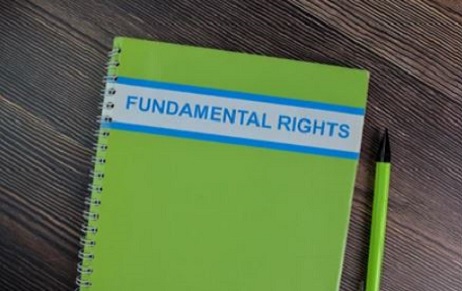INTRODUCTION: The Indian pharmaceutical companies are in a unique position where they are balancing the…
Significance and Violations of Human Rights during Covid-19 Lockdown
Franklin D. Roosevelt (FRD) on different platforms, supported the Indian Freedom Struggle making the abovementioned quote implement in his life in a true sense. Indian freedom struggle is said to be started from The First War of Independence in 1857, in which various brave freedom fighters like Rani Laxmi Bai and Mangal Pandey laid their lives. It further ended up in 1947 when India got independence after the serious efforts of Netaji, Sardar Patel, Mahatma Gandhi, and others. The whole philosophy of this struggle was based on ‘Swarajya,’ which means self-governance. Although the word said to be coined by the first freedom fighter Bal Gangadhar Tilak,[i] it finds its roots in Shivaji’s struggle to establish self-governance by kicking out the foreign invaders who had captured India during that period.
The ‘Swarajya’ was motivated by the basic human rights that were not available to Indians in colonial rule. The lawmakers, while framing the Indian constitution, formulated a committee under Sardar Patel to ponder over these rights, which led to the inclusion of Fundamental Rights in Part III of the Indian Constitution. The colonial empires were facing economic, political, and social hardships during that time. Subsequently, this led to the freedom of various nations from the dark past along with the awareness of basic rights among them. As a result, on December 10, 1948, the UN General Assembly adopted the Universal Declaration of Human Rights (UDHR) in Paris,[ii] with 48 countries voting in favor, including India.
Thus, for centuries this has remained the importance of Human Rights. The example provided above is only of the Indian freedom struggle. However, the author feels that human rights are of utmost importance in the freedom struggles of different nations, for instance, the American[iii] and French Revolution.[iv] This article considering the contemporary scenario, attempts to delve into the question of how and what human rights get violated in the world due to the recent Coronavirus lockdown. It elucidates what UDHR states, and is there any sanction that can be imposed on a signatory nation of UDHR if it violates its principles. Moreover, it also talks about how such violations might get contained so that citizens can enjoy their rights without any fear.
A BIRD’S-EYE VIEW OF UDHR
The General Assembly resolution 217A was adopted as UDHR on December 10, 1948, in Paris as a common standard of achievements for all nations and all individuals. It puts forth, for the first time, several fundamental human rights to be defended universally by all the countries of the world. More than seventy human rights treaties have been inspired from and formulated keeping in mind the UDHR that are applied today at a global and regional level permanently. The UDHR contains 30 articles including the right to life, liberty, and security; right to non-discrimination, freedom of movement and residence; right to recognition; freedom of speech and expression; right to rest and leisure time; right to education; and right to health. However, it doesn’t provide for any sanctions that can be imposed on nations if they disrespect or violate any of the human rights enshrined in it.[v]
COVID RESTRICTIONS AND HUMAN RIGHT VIOLATIONS
COVID-19 virus came to known at the end of the year 2019,[vi] which first engulfed the whole of China and later the whole world. Most of the nations have to implement lockdown in their country so that they can prevent the spread of this virus and save the lives of their countrymen. However, even after the formation of vaccines, it is still spreading and mutating at a greater pace. It is still unknown whether it is a natural virus or a virus created in labs of China as a weapon for biological warfare that got unleashed either deliberately or unknowingly. The virus has the capacity to spread from one person to another if they come in contact with one another. Considering these characteristics of coronavirus, various governments, including the Indian government, imposed lockdown in their nations.
In March 2020, the Indian government imposed a 21-day lockdown,[vii] which subsequently increased and got partially ended June 08, 2020. However, even in April 2021, the coronavirus with its new strain has unleashed havoc in India that’s why various districts and states are again pondering to implement lockdown. In a similar manner, the UK government also announced a lockdown on March 23 that got somewhat eased by May 10 of 2020.[viii] Spain, Iran, Italy, Denmark, Israel, Germany are also a few countries among the others on the list that have imposed lockdown.[ix]
Though the intention behind the implementation of these lockdowns was to prevent the spread of COVID-19, it resulted in gross human rights violations in various countries. Several instances also got reported in different nations where citizens faced violation of their rights in the garb of such lockdowns.
Such lockdown on their face violated various human rights enshrined under UDHR, such as the right to liberty, freedom of movement, freedom of peaceful assembly and association, right to work, right to education, and right to freely participate. However, the UN has stated that restrictions on such rights can be imposed if there exists a serious threat to public health.[x] The COVID-19 pandemic can be said as a potential threat to the lives of citizens. Thus, the imposing lockdown was not any problem, but the problem arises in its implementation.

When the lockdown got implemented, the poor people have left away with nothing. They lost their sources of earning (like the migrant labor crisis in India), which was a gross violation of the right to work, food, and water. President of Filipino, Duterte said in a public address that one who will violate the lockdown provisions would get shot.[xi] While no one got shot, reports alleged that police have put people in animal cages and subjected them to physical punishments. Similarly, South African police also subjected lockdown violators to physical punishment, water cannons, and rubber bullets.[xii] In India, migrant workers get subjected to the spraying of harmful chemical solutions containing bleach to get “disinfected.”[xiii]
In Iran, nearly thirty-six prisoners were killed who were protesting in fear of their risk of contracting coronavirus, reported Amnesty International.[xiv] Such police abuses to implement the restriction depict the violation of the right to life, freedom from excessive force, torture and humiliation, right to due process of law, and accountability on the part of the government to such international standards. Moreover, the United Arab Emirates, Australia, Singapore, Austria, Hong Kong, and Britain imposed fines exceeding three thousand dollars if someone violates the lockdown. Thus, severely affecting right to life of poor and marginalized section.[xv]
MEASURES TO PREVENT SUCH VIOLATIONS
Such grave human right violations during the time of a pandemic which not only affected the physical psyche of the men but it also plundered the mental stability. Due to the loss of near and dear ones, people are suffering mentally much greater in comparison to their physical health. The West African Regional Office of the High Commission on Human Rights during the West African Ebola pandemic released an instructive order elucidating measures to be taken to contain the Ebola virus.[xvi] They stated that one has to take steps for:
- Peacefully diffusing protests before they take place.
- Giving clear orders to security forces to refrain from excessive force and abuse of power. Give clear guidelines on what is reasonable force and what is not.
- Assurance that there will be independent investigations for human rights violations.
- Ensure national and local laws are implemented as per the principles of due process.
- The allowance of religious and education programming on public television and radio to supplement the inability to meet for educational and religious purposes.
- Insurance that all quarantined people had access to food, water, sanitation, and medical assistance.
Such measures if would have implemented in past, or might get implemented in future shall play a crucial role in containing COVID-19 along with alleviating such human right violations. Implementation of these rules might not completely end up the human right violations, but they can minimize the same to a certain extent.
CONCLUSION
It is a well-known fact that we are facing unprecedented times due to COVID-19, which has unleashed havoc on humanity as well as succumbed to the health infrastructure of various countries. It is of utmost importance that government should treat people during this delicate period with care and protection. They must not breach their duty and should abide by the rules formulated in UDHR.
Even UN High Commissioner for Human Rights Chief Michelle Bachelet, considering the human rights violations during lockdown period stated that COVID-19 is not an ‘excuse’ for human right violations. [xvii]The problems of human right violation cannot be solved overnight. The government has to ponder over how to create and implement its policies so that they might not affect the basic human rights of citizens. The government and citizens together have to fight this battle against COVID-19 so that it might lead to a win-win situation for everyone.
Although it emerged that COVID-19-induced policies can infringe on human rights in many countries, it demonstrated that the rights and freedoms of the people are rather limited and are trampled on by the authorities at the first signs of a threat to health. As much as governments across the world sought to tame the virus, they imposed serious measures in form of lockdowns, which in one way or a other saw terrible violation of human rights. While some abuses are related to the right to work and freedom of movement, some issues that are even worst whereby people get killed by the police during unrest, all these measures have called for the need to have a more humanitarian way of handling any form of crisis.
Civil liberties, guided by the UDHR’s declarations, remain undeniable, even when it comes to emergencies. Despite the rationale behind the lockdowns being the preservation of people’s health, it ignored socio-economic conditions of the vulnerable, causing a lot of suffering. For example, the findings of a study on migrant workers in India showed severe deprivations of workers’ rights, whereas enforcement measures in the Philippines and South Africa demonstrated a general lack of respect for human dignity and legal procedures.
In turn, the UN High Commissioner for Human Rights, Michelle Bachelet corded the affair that the pandemic cannot be an ‘excuse,’ for abusing human rights. Currently, it is necessary for governments to come up with a better approach of ensuring public health without violating people’s freedoms. To reduce these problems, it is possible to apply measures that include writing operational procedures and protocols for the police, guaranteeing the delivery of necessary products and services for the quarantine- confining citizens, as well as conducting separate investigations on cases of abuse.
The lessons to be drawn can be obtained from the West African experience of the Ebola virus disease outbreak. Measures originating from human rights include procedural fairness and availability and can assist in warding off the effects identified during lock downs due to COVID-19. In the future, governments should ensure that they come up with policies that uphold human rights while at the same time dealing with diseases.
Thus, the COVID-19 experience underlines the necessity of a more effective and sensitive approach to crises, which takes into account human rights. Officials and legislative branches of the government have the responsibility to protect people, especially during pandemics, it is necessary to exclude measures that worsen the conditions of those who are already disadvantaged. From the analysis of the case, it can be noted that understanding the shortcomings of previous periods, and attempting to work towards a less destructive future for human rights, it is possible to gradually build a world based on justice and stable in its development.
Author: Kaustubh Kumar, a student at Presidency University, Bangalore, in case of any queries please contact/write back to us via email to chhavi@khuranaandkhurana.com or at IIPRD.
REFERENCES
[i] https://www.hindustantimes.com/ht-school/bal-gangadhar-tilak-he-held-high-the-torch-of-swaraj/story-Aob7Nusy4kk7mMBX59pQOK.html
[ii] https://www.un.org/en/about-us/universal-declaration-of-human-rights
[iii] https://www.britannica.com/event/American-Revolution
[iv] https://www.britannica.com/event/French-Revolution
[v] https://www.un.org/en/about-us/universal-declaration-of-human-rights
[vi] https://www.who.int/health-topics/coronavirus#tab=tab_1
[vii] https://www.business-standard.com/article/current-affairs/here-s-a-timeline-of-events-since-lockdown-was-imposed-in-india-120070201413_1.html
[viii] https://www.theweek.co.uk/107044/uk-coronavirus-timeline
[ix] https://www.businessinsider.in/international/news/a-third-of-the-global-population-is-on-coronavirus-lockdown-x2014-hereaposs-our-constantly-updated-list-of-countries-and-restrictions/slidelist/75208623.cms
[x] https://www.refworld.org/docid/4672bc122.html
[xi] https://www.newsheads.in/world/news/coronavirus-quarantine-violators-locked-in-animal-cage-in-philippines-article-60924
[xii] https://www.theguardian.com/world/2020/mar/28/south-africa-police-rubber-bullets-shoppers-covid-19-lockdown
[xiii] https://timesofindia.indiatimes.com/india/migrant-workers-sprayed-with-disinfectant-in-up/articleshow/74888075.cms
[xiv] https://www.amnesty.org.uk/press-releases/iran-more-30-inmates-killed-security-forces-during-covid-19-jail-protests
[xv] https://www.nydailynews.com/coronavirus/ny-coronavirus-hefty-fines-jail-time-expulsion-quarantine-orders-20200321-o3uc6id5vvhsxkcb3ahpikcqci-story.html
[xvi] http://globalhealth.org/wp-content/uploads/A-human-rights-perspective-into-the-Ebola-outbreak.pdf
[xvii] https://www.devex.com/news/covid-19-is-not-an-excuse-for-human-rights-violations-un-human-rights-chief-says-98192



